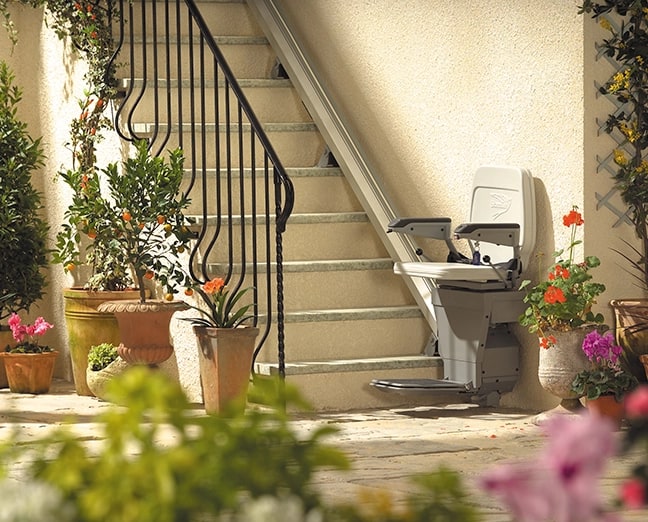If you look for it, there seem to be dangers and safety hazards everywhere. Take some tips and make some efforts to stay safe at home- as well as when you are away- with some simple and sensible steps that can reduce risk of injury, incident, and issues- including death.
Play it safe at home and when away. Observe National Safe at Home Week, August 21-25, 2020, by taking strides toward creating a safer environment. The purpose of this observance is to raise awareness of hidden dangers lurking at home- and away! Did you know that nearly 170,000 Americans died in 2017 as a result of unintentional, accidental deaths? Most occur at home or in close proximity, such as driving through the neighborhood. From mobility devices and security systems to poison control and smoke detectors, here is what you need to know to stay safe at home and away:
Have What You Need
Stock up on essentials for your home so that you are never forced to go out for something that you need, like pet food or water. Keep a small stockpile whenever possible. Also, pack a kit for when you go out- even if it is just taking a ride across town.
Some things that belong in your essentials kit include:
- Personal protective equipment, including face mask, rubber gloves, and hand sanitizer
- Bottled water
- First aid supplies, including medications
- Spare pair of eyeglasses or contacts, if possible
- Food
- Cash and coin
Keep a few simple supplies in the trunk of your car or in a bag by the door, for when you are away from home. Weather, traffic, and becoming lost are just a few incidents when this stash will come in very handy.
Reduce the Risk of a Fall
Falls are a true safety hazard. It is estimated that over 36,000 people died from falls in the US in 2017; it is the number one cause of death for people over age 65. The key to reducing the risk of falls is vigilance in maintaining a safe environment. Clearing clutter, improving lighting, preserving vision, and investing in mobility devices can be a powerful approach to reducing fall risk at home- and outside the home, too.
Avoid Poisoning
Read labels to avoid toxicity and accidental poisoning. Keep poison control’s phone number programmed in your cell phone to save time in the event of an emergency. A person can become incapacitated by poisoning with gas, chemicals, food, and drugs, though prescription drug poisoning or overdosing is the most common. Always take medications as directed and dispose or properly.
Stay Safe in the Car
Never get behind the wheel of a vehicle when you are under the influence or if you are overtired. Car accidents are the second biggest reason for unintentional accidental death in this country. Distracted and impaired driving are just two causes of accidents- and both are perfectly preventable. Be wary of getting in a vehicle with an inexperienced driver- particularly when conditions are challenging, like during storms or after dark.
Don’t Test the Weather
The weather can be wild and natural disasters are something you may not be able to control. You can, however, prepare for these disasters with emergency supplies on-hand. Stay inside and off the roads during these events. Coordinate an emergency plan with family before it is needed.
Install Smoke Detectors
Do you have working smoke detectors throughout your home? It is estimated that a working smoke detector will cut the risk of dying in a fire by 50%. Since you are going to be buying smoke detectors, go ahead and beef-up your carbon monoxide detectors at the same time. Carbon monoxide poisoning is a silent killer, taking around 200 lives each year.
Use Safety in the Water
A person can drown any time of the year. In fact, around ten people drown each day and it is the leading cause for accidental death in children under the age of four years. Never leave a child in a bathtub alone- nor should you ever permit children to swim in pools unsupervised. Fence in your pool and keep it contained so that there is no chance of a child falling in the water. Learn CPR; it could save someone’s life one day.
Holidays Have Hazards
The holidays present their own distinct challenges and safety hazards. Some common dangers include travel risks, fire hazards, cold weather, toy injuries, food poisoning, and risks associated with holiday decorations, like choking. During these times it can help to borrow a second set of eyes to evaluate your home environment- and to point out dangers that you may have missed.
If you or someone you love has physical limitations, talk to the professionals at Pacific Mobility; Pacific Mobility offers top-of-the-line mobility aids and devices to assist in accessibility. From scooters to stairlifts, come talk about how to enhance everyday life with the right mobility equipment in the Bay Area.
President, Husband, Father, Grandfather Graduate of UC Davis- Bio Sci Major- Go Aggies! Jeff has extensive experience in all of Pacific Mobility’s products and services, and specializes in accessibility products as well as stairlifts, ceiling lifts and custom wheel chairs. His hobbies include spending time with family, gardening, mountain biking, exercising and off road motorcycle riding.
24 years as Owner/President of Pacific Mobility Center – selling, installing, and servicing stairlifts, porch lifts, ceiling lifts, pool lifts, handicap ramping, specialty wheelchairs, scooters, power wheel chairs, and other power mobility devices
Certified Environmental Access Consultant since 2008
Licensed General Contractor since 1998
Certified Aging in Place Specialist since 2016
Board Member for Home Access Professionals
Member of Association of Members of the Accessibility Equipment Industry (AEMA)




